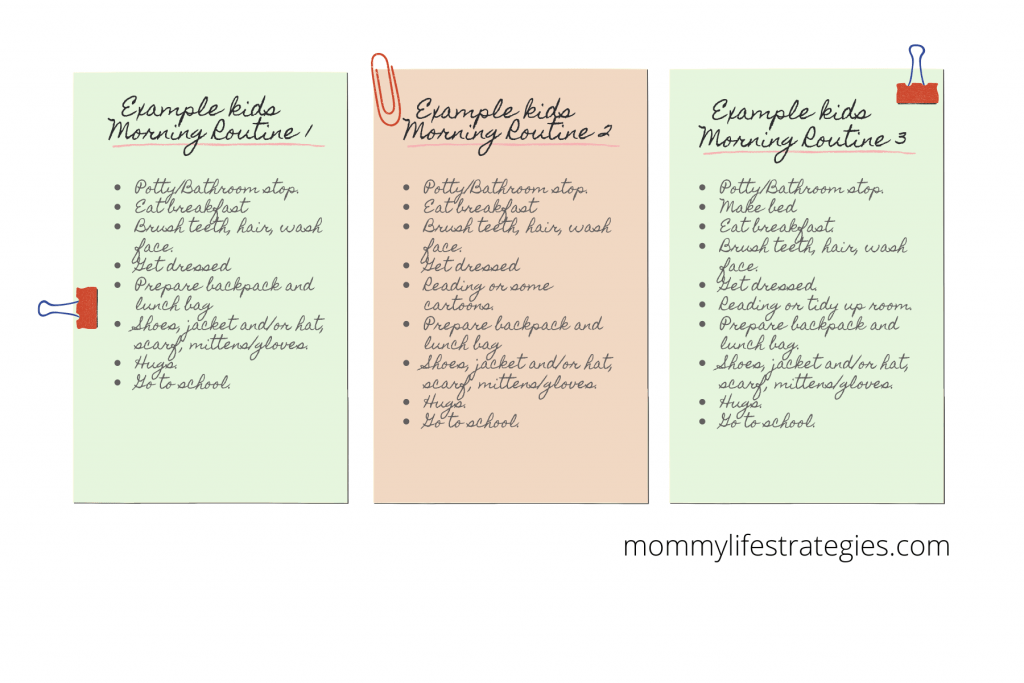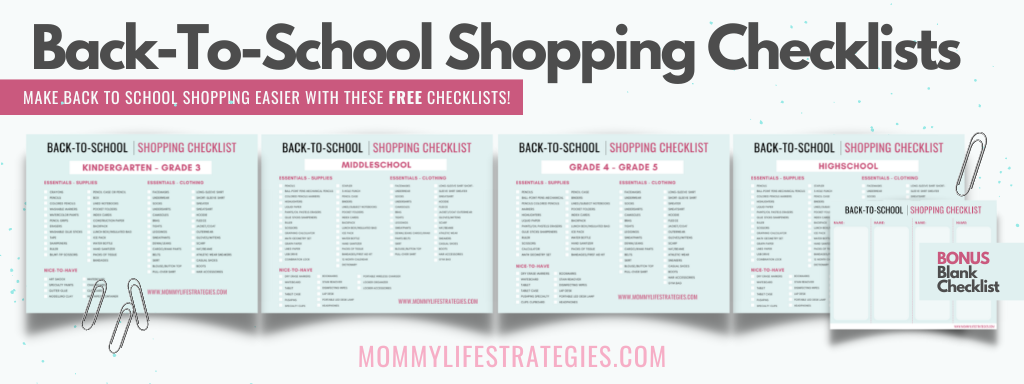
Good routines are vital if you want your days to function properly and reduce the stress that a chaotic routine can bring. With the new school year fast approaching, changes to your routine will need to be made to adjust to this.
It can be tough, especially if you don’t plan and begin making the changes beforehand. The routines that will change are your sleep, morning, evening, meals, and family time routines.
Let’s dive into the routines that will need to change for back-to-school.
This post contains Amazon affiliate links. An affiliate link means at no extra cost to you, I earn a commission if you make a purchase through my link. Please read my Disclaimer for more details.

1.Sleep Routine
Right now, you and your family are probably sleeping in and at different times too. Getting a few extra minutes of sleep is good but when school starts sleeping in won’t be an option. Start by getting the kids to bed a little earlier each night.
After a few days, they’re schedule will change to sleeping earlier and waking earlier. The key here is to start a few days before school and slowly shift bed times. A few minutes minutes earlier each night won’t feel like a big change and you’re less likely to get resistance from your kids.
Sleep is the one big priority every family should start with first. Not getting started on a good sleep routine before school starts can make school mornings miserable.
Here are some tips that both you and your family can practice for a better sleep schedule.
Tips for a better sleep routine:
- Avoid screens before bed at least an hour before sleep as the blue light emitted will keep you awake. Bright screens include your TV, computer, or phones. Get your bedrooms ready for your nighttime ritual. Low warm lighting, relaxing music, or a book to help you unwind. Set your phone to ‘nighttime’ mode or shut it off so you can focus on unwinding for the night.
- Avoid chocolate and caffeinated drinks in the evening. I love both coffee and chocolate and like to give myself a little lift during an afternoon slump. But I know that if I have any stimulant after 12pm, I’ll be up way too late. A friendly reminder, that the stimulation you get from a coffee can last for hours. It’s best to cut yourself off by lunchtime so you’re not tossing and turning all night.
- Stretch a little. Stretching is a great wind-down activity for you and your family to relax before calling it a night.
- Manage overwhelming thoughts and feelings through journaling. This can be a helpful activity for you and your kids. You can’t have a good night’s sleep if you are up all night worrying. Start a journaling habit for better sleep. Keep a notebook next to your bed and unload any mental baggage that might be keeping you up.
- Set up your environment for rest and relaxation. Make your bedrooms conducive to good sleep by making sure you have the right lighting, comfortable temperature, reduced noise, a clean and decluttered space.
- Be consistent. A good sleep routine won’t last long if you’re inconsistent with your sleep and wake times. If you’re not consistent you will be back to your old sleep habits fast and will be scrambling to get out the door in the morning.

2.Morning Routine
Your morning will determine if you and your kids can make it out the door on time. Without an efficient and organized morning routine, expect some chaos.
Good news, you still have time to clean up an ineffective routine and one way to start is by doing a pretend back-to-school morning practice.
Think of it like a rehearsal, set your alarm as you would if you were to get the kids ready for school. Wake up, don’t hit the snooze button!
Prepare coffee, breakfast, and wake up the kids. They might resist but do your best to get them up. Have them get dressed and shoes on after finishing up breakfast. Set a time to be out the door. Because there’s no school yet, go for a morning walk to the park or beach with the family.
Do this a few times before school starts and your morning routine won’t feel chaotic.
After you’ve had a few practice runs, decide how much time you need in the morning from start (wake) to finish (out the door, in the car and to the school). It will give you a good idea of what you can do in the morning and do it smoothly without too many delays.
How your morning routine unfolds spills out onto the rest of your day. Make it work for you, so you are not frazzled or dragging your feet during the day.


Tips for a better morning routine:
- Assess your current morning routine. What do you want to do better? What’s your ideal morning? What are some things you do in the morning that make it harder to get things done and kids prepared for school? What is taking up too much of your time in the morning? Think about your routine right now and what you can do to improve your mornings.
- Eliminate unnecessary tasks. Some moms feel they have to do many things in the morning for it to be productive, that’s not true. You can keep it simple and do only what’s important and still get a lot done. For example, fancy breakfasts created to look like your kids’ favorite cartoon isn’t necessary for a good morning routine. Occasionally sure but don’t feel the pressure to do this every morning but it might not be sustainable for you. Simple yet nutritious breakfasts are adequate.
- Get your family to help out. In age-appropriate ways, get your kids to help with morning tasks. It encourages independence and takes the burden of doing all the tasks on your own.
- Eat a proper breakfast to fuel your body. Some people don’t like to eat soon after waking, if that is you or your kids swap breakfast with a task you would do afterwards. Getting your body moving might help you and your kids gain an appetite enough to fuel up before you have to head out the door.
- Review your day (check your planner) and prioritize most important tasks. Prepare yourself and decide which tasks you want to focus on. Be mindful of where you focus your energy and do one task at a time.
- Use smart devices to knock out mundane tasks. Smart devices like your smart phone can save you minutes every day which can add up. Google Assistant can be a morning routine lifesaver as well as smart home appliances if you have them. Smart devices use voice control so it’s hand-free and that can be very useful when you have to get the kids to school. If you’re not using your smart devices to make your morning routine easier, now is the time to give it a try.
- Keep track and monitor how your mornings are going. This can be a part of your evening routine (more on that coming up) Maybe your morning routine is going so well that you have a few extra minutes left before you have to drop the kids off. If that’s you, great! Keep it up. If not, that’s okay. As long as your mornings are not holding you back, you’re on the right track. Make the necessary tweaks to your routine if you’re feeling the mornings are more rushed than you want them to be.

3.Evening Routine
You can’t have a morning routine without an evening routine. The routine you have in the evening preps you for the day ahead and gets you ready to execute your morning efficiently. It sounds like a lot of work, but it will save you more work in the long term.
If you tend to scramble last-minute lunches in the morning. The evening can be a great time to prepare them without the rush.
Hate having to go back and forth with your kids on deciding what to wear? Prepare and lay out clothes in the evening. No more having to think about it or pester your kids to finally choose something.
The evening is a good time to not only prep for an easier morning, but it’s also a good time to reflect and relax.
Tips for a better evening routine:
- Plan for next day done BEFORE you sit in front of the TV or computer. Get into the habit of clearing the priorities in the evening before relaxing. Personally, I find it difficult to get up from the couch watching a good show to load the dishwasher, pack a lunch or plan for the week ahead. If that’s you too, get obligations done and out of the way before you wind down for the evening.
- Check your family chore chart and do what’s on the schedule. Chores need to get done and can pile up if you slack. Avoid the overwhelm of accumulating tasks, stick to your family chore schedule. It’s a team effort so don’t do it all yourself. Get all family members involved in keeping the house in order.
- Do as much as you can in the evening, so you have more time in the morning. If you typically shower in the morning, try showering in the evening. Look for any tasks you do in the morning and try doing them in the evening. Careful not to overload yourself with too many tasks in the evening. Just one small task like having a shower in the evening instead of morning can have an impact.

4.Meal Planning and Prep Routine
Don’t forget to plan lunches for your family before school starts. Whipping up school lunches last minute might make for a less than favorable meal. A little bit of planning and preparation is all you need to have a good system.
Well planned and prepped lunches don’t have to be fancy or elaborate. While I think those animal shaped foods on Pinterest are super cute, they are not necessary. You can still make lunches your family will look forward to eating.
Here are tips to plan and prep school lunches effectively.
Use durable and easy to pack storage containers.
Thankfully, good storage containers are readily available and affordable. Make sure that your kids lunch boxes are insulated and can be used for both hot and cold storage.
Bento-style boxes are great because they have divided compartments. With divided compartments you don’t need plastic storage bags. Less waste and keeps food intact.
Purchase packaged foods carefully
As you know, most packaged foods are processed. We want to avoid processed foods as much as possible, but it would be unrealistic to never purchased packaged foods.
For one, they are convenient and can save time. Some don’t need refrigeration or cooking either.
If preparing a 100% whole foods lunch is just not sustainable for you, that’s okay. There are many packaged foods that are quite healthy and are fine in moderation. The key is to find a balance.
One small pack of fruit gummies or crackers is not going to be a problem and I wouldn’t stress out about it. Use you best judgement, choose packaged foods in moderation and always check labels.
Don’t forget to purchase allergen-free foods if it’s your child’s school policy.
Make extras at dinner time. Honestly, large batch cooking is not my jam. I prefer to make extras when I cook a meal. For example, if I’m baking chicken breast in the oven, I will bake just double so that they can be used for tomorrow’s meals. For grains and starches, I will do the same and make double so I can use it for another meal next day. For veggies I like to buy precut making it super easy to add to a plate.
Frozen foods are a time saver too. Frozen veggies and fruit are convenient and if you are meal prepping, they can be added to your food container frozen without having to thaw. They will thaw by lunchtime.
Planning school lunches
- Have a master list of lunch foods and meal ideas. Having a master list to refer to can make meal planning and prep easy and fast. Create four columns on a page and label them Protein, Grain/Starches, Fruits/Veggies and Snacks. Take some time to create a list of foods for those categories you know your kids will like and eat. Get your kids involved too, let them help you build the list. When it’s time to make lunches, you can refer to this list to build a fast, nutritious, and delicious lunch every-time.
- Plan by week or entire month. This will depend on you and what you prefer but it’s even more helpful to plan several days of meal ideas ahead of time. This will be easier after you prepare you master list of foods. With a weekly monthly meal plan, you and your kids know exactly what to make without having to think about it.
- Get your kids to help or prep their own lunch. Even your littles can help in a small way like adding a juice box or some chopped fruit to their lunch bag. If your kids are older, they can prepare their own lunch. It could be before or after they brush their teeth or soon after dinner. Choose a time that works best for you and your family.
Prepping school lunches
- Aim to prep lunches the night before to save you time in the morning. Use the extras you cooked at dinner to prepare lunches. The extra chicken breast can serve as a chicken salad sandwich or a shredded chicken and veggie soup.
- Cook using a crock pot or pressure cooker so you don’t have to hang around a stove. Lunches can be made using one pot methods. Crock pots are great because you can add all your ingredients before you go to bed and wake up to a home cooked meal. When done, just add to a thermos container, pack and you’re done.

5.Chores Routine
Sadly, we can’t escape household chores. They need to get done like any other essential task. An excellent way to keep on top of household duties, is to create a chores chart or chores list.
If you don’t have a chores chart/list already, start now. If you’re like a lot of moms, you’re probably taking on most chores.
Start delegating household tasks to your spouse and kids. Even if they are young, there are still age-appropriate chores they can do that still helps lighten the load. Here is a good list of chores you can delegate to your kids by age group.
There are many benefits to keeping a chores chart for your family.
- It makes it easy for family members to see what needs to get done.
- It teaches responsibility and life skills.
- It provides children with a sense of accomplishment and contribution.
- It maintains an organized routine.
- It allows you to schedule chores at appropriate times.
Recommended: How to Fairly Share the Mental Load With Your Spouse
Tips on how to maintain your family chores routine
1.Teach them first. If your kids haven’t done a particular chore before, do it with them until they can do it on their own. They are more likely to keep up with chores if they feel they can do them independently.
2.Motivate your kids with rewards. Offer a small reward like a few extra minutes to watch their favorite television show. It could be money or treats they don’t get often. Don’t expect kids to do chores simply for the act of doing them. They need an incentive otherwise they won’t feel it’s worth it. Use rewards wisely to keep the motivation up.
3.Give praise for their efforts and a job well done. The reward they receive might be enough for them to keep up with chores but it’s also a good idea to give them praise for their efforts. Tell them what they are doing well and that their contribution to the family is very important and is valued.
4.Make it fun. I’m an adult and I sometimes need to do things to make it more tolerable. Use energetic music or video to help get you and your kids moving. Make it a game. Set a timer and make it a race to see who can get it done faster.
5.Be specific about what needs to get done. If the chore is too broad, like ‘Clean room’, or ‘Clean closet’, your child might struggle to even get started because where do they start? Instead of ‘clean room’, be specific like, ‘Pick up books off the floor and place on shelf.’ They know exactly the task to be done and saves them the hassle of having to keep asking you what they need to do.
6.Do it together. Family is a team that needs to work together. Chores will get done faster when working together alongside a clear list of what needs to get done. Chores can be a great way to connect too.

6.Family-Time Routine
For some families the summer break is when they spend the most time together. Going back to school can be a bummer because you think the fun has to end. Families can continue enjoying fun family activities together, it just means that you will need to be more diligent with planning.
How can you fit in family time during a busy school year?
You have more time than you think but keep in mind that family activities should be focused on quality and not quantity.
I’m not going to tell you how much time you need to spend with your family. There is no magic number.
So, if you’re feeling guilty you aren’t spending a certain amount amount of time with your kids, let it go. Know you are doing the best you can and focus on being present with your kids and spouse whenever you can.
If you know your schedule will be demanding during the school year, carefully plan and schedule family activities in advance.
I recommend planning out a full year of family activities that are realistic for your family. Since you are already planning for things like birthdays, holidays, and other events. Planning a year out can help you commit to family time more than you were to not plan at all. Not having to worry about what to do is also a benefit to planning far in advance.
Careful not to overbook because you still have to account for school and work events and other obligations. Commit to only what is priority first.
When life gets demanding we can forget the many fun, cheap and free activities families can do together. Here are some ideas for you to add to your family calendar.
A quick tip: Set a rule that no one is to use or check their checking phones, tablets, or gaming devices. Emphasize that family time is quality time spent together.
Enjoyable at home activities
- Cook or bake together
- Movie night
- Sports game night
- Build something together like a 3D model
- Learn to play an instrument
In the neighborhood
- Go for a walk
- Hike
- Bike
- Volunteer
- Neighborhood cleanup
- Plant a tree
- Raise money for charity
Community programs
- Swimming
- Martial arts/Self-defense
- Dance
- Art
- Pottery
Traditional & Nostalgic games
- Bowling
- Chess
- Hockey
- Flag football
- Dodge ball
- Laser tag
- Arcade
- Dominoes
- Hide & Seek
These are just a handful of activities you can do together. You can also take advantage of seasonal events, sports, and holidays. If you have a backyard, you can use that space to do activities like setting up a tent and camp at home.
Take a short trip to a nearby city to visit a museum, theatre, aquarium, drive-in theatre, live sports, or other attraction you can’t get at home.
Remember that it’s about the quality of time together, not the quantity. Choose activities that are realistic and fit your family schedule.
Be flexible and don’t expect perfection. There will still be crazy days and your finely tuned routines will seem to fall apart. Routines are supposed to make your life simpler, enjoyable, and more efficient. It’s not intended to be more work or more stress.
When your routine works against you, re-evaluate. It could be something minor and be easily fixed or it could be some bad habits creeping up that you didn’t notice.
Most importantly, make sure you are not forcing an unnatural routine. Meaning you are creating a routine that makes you miserable and brings out the worst in you and your family. Your routine should flow as naturally as possible, give you momentum and motivation for the day ahead.

